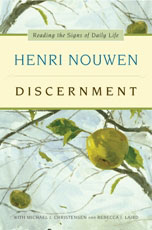"Thomas Merton identified the 'signs of the times' as kairos — a quality of time that is eternal, when time is full of meaning and events point to divine purpose. In one of many reflections on the topic, he wrote, 'The Bible is concerned with time's fullness, the time for an event to happen, the time for an emotion to be felt, the time for a harvest or for the celebration of a harvest.' The Bible can be a good guide for our interpretation of events as we look to discern what God is doing and remember that God's design and final purpose is that God will ultimately reign and God's ways of love will prevail. God's ways are not always our ways. God's timetable is not always our timetable. Discernment calls us to settle into God's ways of measuring time.
"Clock time (chromos) is divided into minutes, hours, days, and weeks, and its compartments dominate our lives. In chronological time, what happens to us is a series of disconnected incidents and accidents that we seek to manage or subdue to feel in control of our lives. Time becomes a burden unless we convert it into God's time.
"God's time (kairos) has to do with opportunity and fullness of meaning, moments that are ripe for their intended purpose. When we see time in light of our faith in the God of history, we see that the events of this year are not just a series of happy or unhappy events but part of the shaping hands of God, who wants to mold our world and our lives. Even when life seems harried and continues to have hard moments, we can believe that something good is happening amid all of this. We get glimpses of how God might be working out his purposes in our days. Time becomes not just something to get through or manipulate or manage, but the arena of God's good work in us. Whatever happens — good things or bad, pleasant or problematic — we ask, 'What might God be doing here?' We see the events of the day as continuing occasions to change the heart. Time points beyond itself and begins to speak to us of God.
"God's time is timeless. Kairos contains both past and future events in the present moment. Words like after and before, or first or last, belong to mortal life and chronology. God is all in all, the beginning and end of time, and the deeper meaning of history. To gain this wider perspective, we first look backward to see how the seemingly unrelated events of our lives have brought us to where we are now. Like the people of Israel, who repeatedly reflected on their history and discovered God's guiding hand in the many painful events that led them to Jerusalem, so we pause to discern God's presence in the events that have made or unmade us. For by not remembering, we allow forgotten memories to intrude into the present and become independent forces with crippling effects on our lives. Forgetting the past is like turning our most intimate teacher against us. Remembering the past in this way allows us to live in the present and gain hope for the future, until chromos is converted to kairos.
"This view of time helps us practice patience in discernment. If we are patient, we can look at all the events of each day — expected and unexpected — as holding promise for us. Patience is the attitude that says we cannot force life but have to let it grow in its own time. Patience lets us see the people we meet, the events of the day, and the unfolding history of our times as all part of that slow process of development and final liberation.
"Given the nature of kairos, let's take a look at how certain events — critical events, current events, historical events, and even life circumstances — can serve as signposts pointing to the will of God and the new creation for those with eyes to see and ears to hear."
